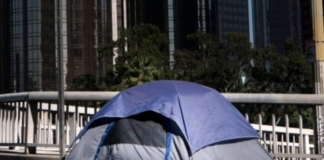Tag: homelessness
Beyond Paternalism or Abandonment in Mental Health Care: An Interview with...
Neil Gong exposes the false choice in mental health policy between tolerant containment for the poor and paternalistic surveillance for the rich.
Who Is Being Targeted for Forced Medical Treatment in NYC? We...
I’m concerned for those forcibly drugged under Mayor Adams' policy. But also because New York City sets a national precedent.
‘It Was a Joint Effort’: Deborah Kasdan on Bringing Her Late...
Author Deborah Kasdan discusses her memoir of her late sister, "Roll Back The World."
Supportive Housing Reduces Homelessness, Health Care Costs
From RAND Review: "On any given night, tens of thousands of people sleep on the streets of Los Angeles, the nation's capital of unsheltered...
Hospitalized and Heading Toward Homelessness
Upon my release I was dumped at a motel with no ID, no money or method of payment, and not even a cell phone to call friends or family for help. My belongings were still locked in a safe back at the hospital. Where are the real advocates for more low-income housing, and where the hell have they been for those who are incarcerated, whether it be in jails and prisons or mental facilities?
Changing Law That Lets Mentally Ill Stay on the Streets
From the San Francisco Chronicle: San Francisco city officials are hoping to change the law that allows homeless individuals with mental health diagnoses to stay on...
We Should Not Forcibly Commit the Homeless During Hurricanes
From Pacific Standard: In an effort to protect homeless individuals from the effects of Hurricane Irma, officials from the Miami-Dade County Homeless Trust used the...
App Allows You to Call Volunteers to Help the Homeless
From Healthline: A new app, Concrn, allows users to request assistance from mental health volunteers for homeless people in need. The creators of the app...
Do We Really Need Mental Health Professionals?
Professionals across the Western world, from a range of disciplines, earn their livings by offering services to reduce the misery and suffering of the people who seek their help. Do these paid helpers represent a fundamental force for healing, facilitating the recovery journeys of people with mental health problems, or are they a substantial part of the problem by maintaining our modestly effective and often damaging system?
On the Corner of Distress & Poverty: What Happens to Our...
In the last few years, Mental Health First Aid has been backed by the President of the United States, the First Lady, the Substance Abuse and Mental Health Services Administration (SAMHSA), and the National Council on Behavioral Health (among others). In fiscal year 2015 alone, the federal budget allotted 15 million toward the Council’s MHFA mission of ‘one million trained.’ Yet, this course – promoted with unprecedented fervor and designed to support the average citizen to identify a mental health ‘problem’ in their fellow persons and (strongly) encourage them to get ‘help’ – has little to say about the importance and emotional impact of meeting basic human needs.
“The Life and Times of Strider Wolf”
In the Boston Globe, Sarah Schweitzer tells the story of a young boy brutally abused by his parents then given to his grandparents who struggled with extreme poverty and homelessness. “Researchers now understood that trauma could alter the chemistry of developing brains and disrupt the systems that help a person handle stress, propelling a perpetual state of high alert. The consequences could be lifelong. As an adult, he’d be more likely to suffer anxiety and depression and heart disease and stroke. His ability to hold a job, manage money, and make good decisions could be compromised. And there was evidence, controversial but mounting, that he could pass on these traits to his children.”
It’s About the Trauma: How to Truly Address the Roots of...
Representative Tim Murphy is a psychologist who proposes unsatisfactory solutions to our most pressing social problems. In a "shockingly regressive" piece of legislation known as the “Helping Families in Mental Health Crisis Act of 2013” (H.R. 3717), he proposes to expand the highly controversial practice of Involuntary Outpatient Committment (IOC) for persons with serious mental illnesses. But that approach is not the answer, as documented in a fact sheet authored by the National Coalition for Mental Health Recovery:

















